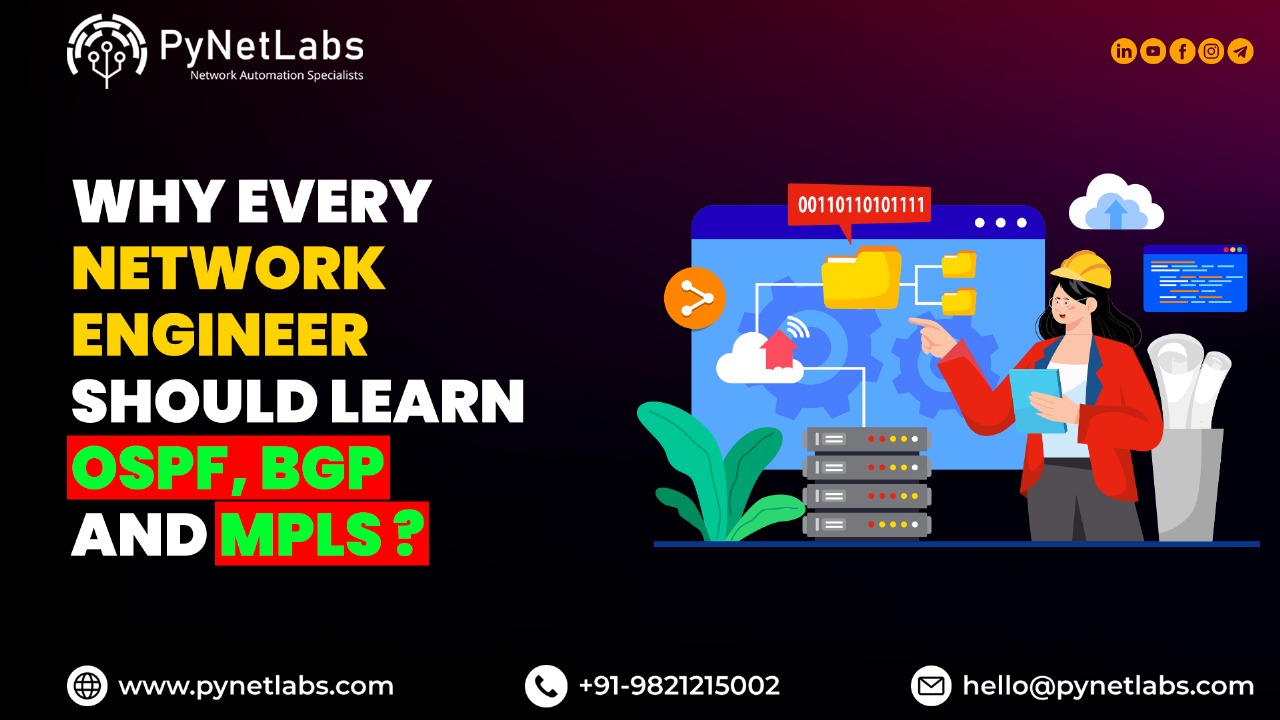Why Every Network Engineer Should Learn OSPF, BGP & MPLS?

Strong 8k brings an ultra-HD IPTV experience to your living room and your pocket.
Introduction
In the ever-evolving world of technology, network engineers are the unsung heroes ensuring that data travels smoothly, securely, and efficiently across local and global networks. Whether you’re managing a small enterprise network or a vast service provider infrastructure, three protocols consistently stand at the core of network design and operation: OSPF (Open Shortest Path First), BGP (Border Gateway Protocol), and MPLS (Multiprotocol Label Switching). Mastering these technologies through a comprehensive OSPF, BGP, and MPLS Course is not just an advantage it’s a necessity. They form the backbone of most modern networks, driving everything from internal communication to internet connectivity and optimized traffic management. If you want to future-proof your career in network engineering, deep knowledge of OSPF, BGP, and MPLS is a must-have skill set. In this article, we’ll dive into why these protocols are essential, how they work together, and how training with PyNet Labs, a leading provider of ha
Understanding OSPF, BGP, and MPLS: The Basics
Before we explore why these technologies are indispensable, let’s briefly define each.
OSPF: The Internal Network’s Navigator
OSPF is a dynamic routing protocol used within a single autonomous system, such as a corporate or campus network. It’s a link-state protocol that allows routers to share information about network topology, so each device can calculate the shortest and most efficient path for data to travel.
Key points about OSPF:
• It reacts quickly to network changes, minimizing downtime.
• Supports hierarchical routing with areas, which improves scalability and reduces routing overhead.
• Commonly used in enterprise networks for its fast convergence and efficient path selection.
BGP: The Internet’s Traffic Controller
While OSPF manages routing within a single organization, BGP governs how data travels between different organizations on the internet. It’s a path vector protocol used between autonomous systems, responsible for making routing decisions based on policies, rules, and network reachability.
BGP’s significance includes:
• Enabling ISPs and enterprises to exchange routing information reliably.
• Handling routing for large-scale networks with complex policies.
• Providing control over internet traffic flow, which impacts performance and security.
MPLS: The Traffic Optimizer
MPLS is not a routing protocol but a forwarding technology that labels packets for efficient data transport across networks. By using labels rather than IP addresses to make forwarding decisions, MPLS dramatically speeds up traffic flow and allows for sophisticated features like traffic engineering and VPNs.
Important benefits of MPLS include:
• Faster packet forwarding compared to traditional routing.
• Ability to prioritize critical traffic through Quality of Service (QoS).
• Creation of scalable and secure VPN services over wide geographic areas.
Why Every Network Engineer Must Learn These Protocols
1. Core to Network Design and Operation
Whether you work at a small company or a multinational ISP, OSPF, BGP, and MPLS are foundational. OSPF enables efficient internal routing, BGP controls your external connections and internet traffic, and MPLS optimizes traffic flow and supports advanced features.
Without a deep understanding of these protocols, designing and maintaining robust networks becomes challenging. Employers highly value engineers who can confidently architect, deploy, and troubleshoot networks built on these technologies.
2. Demand for Skilled Professionals is Skyrocketing
The demand for network engineers proficient in OSPF, BGP, and MPLS has grown exponentially. With the surge in cloud computing, SD-WAN, and global internet traffic, companies need engineers who can handle complex routing and traffic management.
Job listings frequently list these skills as prerequisites for mid- to senior-level roles. Professionals who master these protocols often find more job opportunities and negotiate better salaries.
3. Troubleshooting Made Easier and Faster
Network outages or performance issues often trace back to routing problems or inefficient traffic flow. Knowing OSPF helps you quickly spot and fix routing loops or misconfigurations inside the network. BGP knowledge lets you address connectivity problems and route filtering issues affecting internet access. And MPLS expertise enables you to tweak traffic engineering settings to improve network performance.
This troubleshooting proficiency makes you a valuable asset in any networking team, especially during critical incidents.
4. Prepare for Advanced Network Technologies
Emerging technologies such as Software-Defined WAN (SD-WAN), network function virtualization (NFV), and cloud data center fabrics build upon OSPF, BGP, and MPLS foundations. Understanding these protocols means you’re ready to work with the latest innovations rather than struggling to catch up.
By mastering these core protocols, you future-proof your career, ensuring you remain relevant as networking continues to evolve.
How OSPF, BGP, and MPLS Work Together
It’s common to think of these technologies in isolation, but in practice, they function together to create efficient and scalable networks.
• OSPF manages routing within an organization, making sure data takes the best local paths.
• BGP governs how your network interacts with other networks and the broader internet, deciding how traffic enters and exits your infrastructure.
• MPLS speeds up the forwarding process and enables advanced routing paths and VPNs, optimizing traffic flow across the WAN or service provider backbone.
This synergy lets network engineers design layered, resilient, and high-performance networks capable of meeting complex business demands.
PyNet Labs: Your Gateway to Mastering OSPF, BGP & MPLS
When it comes to learning these essential networking protocols, PyNet Labs stands out as a premier training provider. What sets PyNet Labs its laser focus on practical, hands-on education delivered by industry veterans who bring years of real-world experience.
Why Choose PyNet Labs?
• Expert-Led Training: PyNet Labs instructors are seasoned network professionals who teach you not just the theory but how to apply it in actual networks.
• Realistic Lab Environments: Networking isn’t a spectator sport. PyNet Labs’ training includes immersive lab sessions that mimic real enterprise and service provider environments, allowing you to configure OSPF areas, tweak BGP policies, and build MPLS tunnels hands-on.
• Certification Preparation: Their courses are designed to align with Cisco, Juniper, and other vendor certifications, helping you prepare thoroughly and confidently for exams like CCNP Enterprise and CCIE.
• Flexible Learning Options: Whether you prefer live online classes, self-paced study, or intensive bootcamps, PyNet Labs offers options that fit your schedule and learning style.
• Career Support: Beyond training, PyNet Labs provides resume reviews, interview coaching, and networking opportunities that help you land your dream job.
Thousands of network engineers have elevated their careers through PyNet Labs, gaining the skills and confidence to excel in competitive job markets.
Real Career Benefits of Learning OSPF, BGP & MPLS with PyNet Labs
• Increased Employability: Employers look for candidates with practical expertise and certifications. PyNet Labs’ hands-on approach ensures you stand out.
• Salary Growth: Skilled professionals in these protocols typically command higher pay due to the critical nature of their knowledge.
• Confidence to Manage Complex Networks: Realistic labs and instructor support build your ability to troubleshoot and optimize networks effectively.
• Strong Professional Network: PyNet Labs connects you with instructors and peers, providing a community that supports ongoing learning and career advancement.
Who Should Invest in Learning OSPF, BGP & MPLS?
These skills are valuable for:
• Junior Network Engineers who want to build a strong foundation.
• Experienced Engineers preparing for senior roles or certifications.
• IT Professionals shifting their focus toward networking.
• Recent Graduates and Students aiming for certifications and job readiness.
• Network Architects and Consultants designing complex enterprise or service provider networks.
No matter your level, learning these protocols will sharpen your technical skills and broaden your career possibilities.
Getting Started: How to Learn OSPF, BGP & MPLS with PyNet Labs
Embarking on your networking mastery journey with PyNet Labs is straightforward:
1. Explore Courses: Visit www.pynetlabs.com and review their course catalog focusing on OSPF, BGP, MPLS, and certification pathways.
2. Choose Your Learning Path: Select from instructor-led sessions, bootcamps, or self-paced classes based on your schedule and learning preference.
3. Engage in Hands-On Labs: Practice configuring routing protocols and MPLS in simulated real-world scenarios to cement your knowledge.
4. Prepare for Certification: Leverage their study materials and exam tips to earn valuable vendor certifications.
5. Advance Your Career: Utilize career support services to update your resume, hone interview skills, and network with industry professionals.s
Conclusion
In an increasingly connected world, networks are the lifeline of business and communication. As a network engineer, your ability to design, manage, and troubleshoot networks depends on your mastery of key routing and forwarding technologies—especially OSPF, BGP, and MPLS.
These protocols aren’t just technical skills—they are your gateway to better job opportunities, higher salaries, and roles that challenge and inspire you. Mastering them means you can confidently tackle complex networks, optimize traffic flow, and support the digital infrastructure businesses rely on.
With its expert instructors, hands-on labs, and career support, PyNet Labs is the ideal training partner to help you gain these in-demand skills. Whether you’re just starting out or aiming for senior certifications, PyNet Labs will prepare you to meet the challenges of modern network engineering head-on.
Don’t wait for opportunity to knock—build your own path by mastering OSPF, BGP, and MPLS today. Visit www.pynetlabs.com and take the first step toward a rewarding and future-proof career in networking.
Note: IndiBlogHub features both user-submitted and editorial content. We do not verify third-party contributions. Read our Disclaimer and Privacy Policyfor details.







